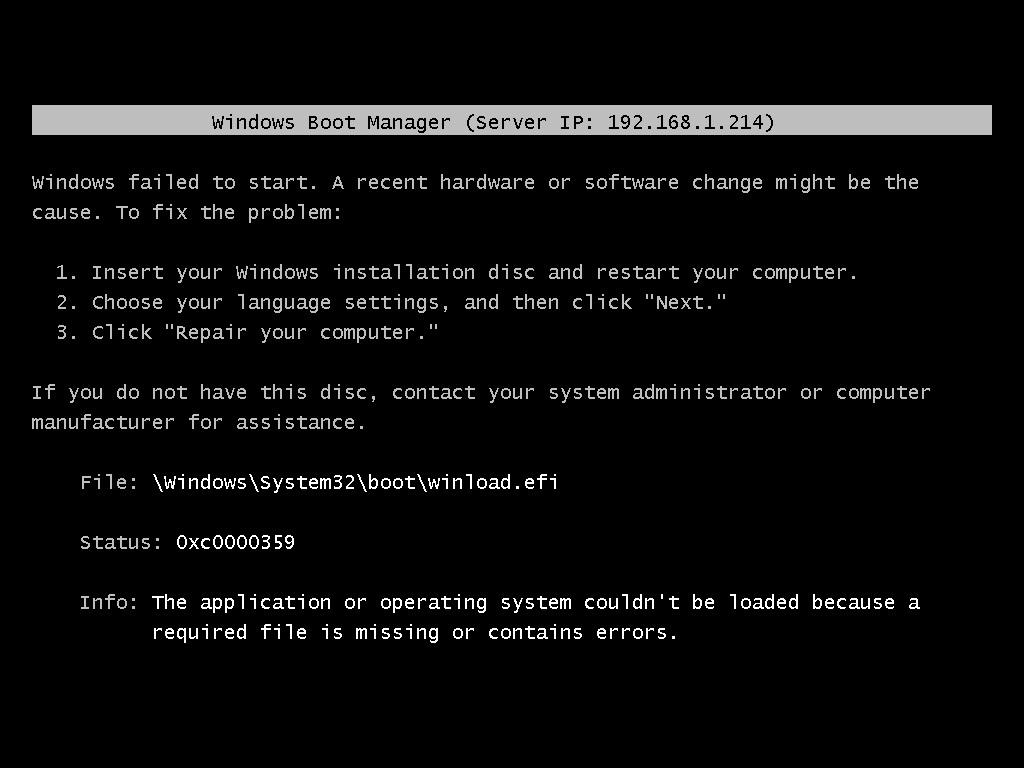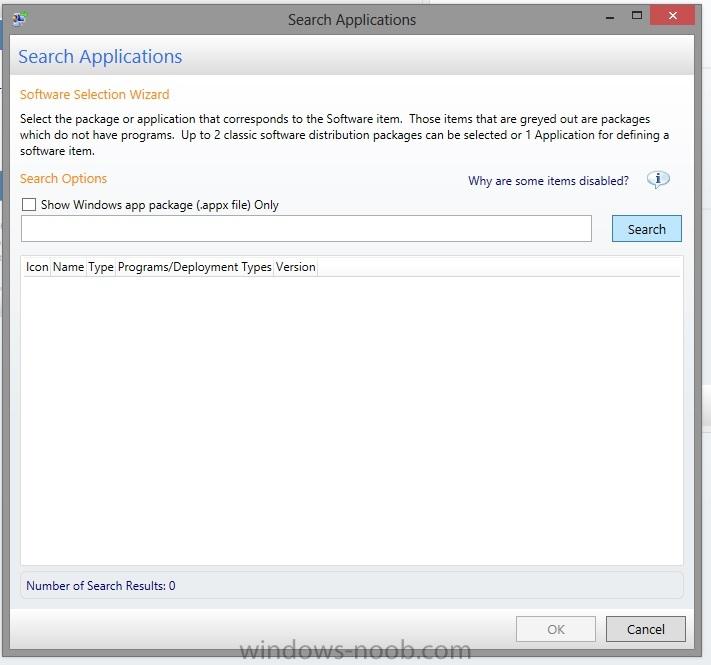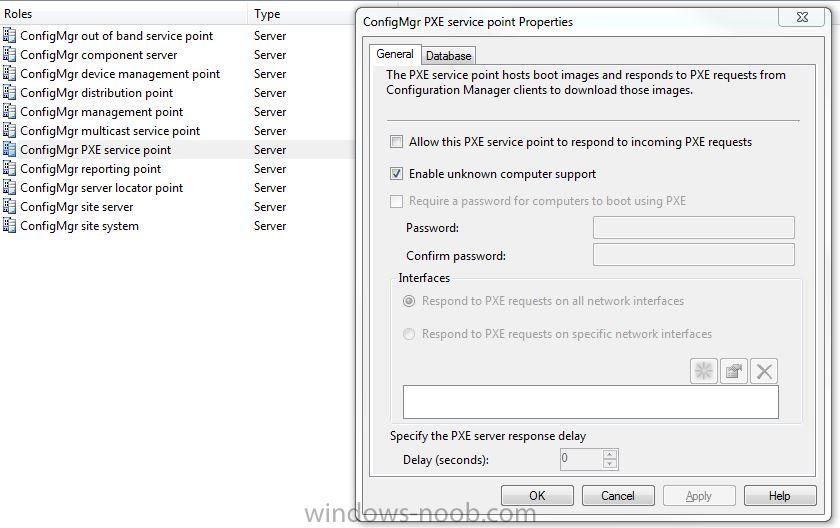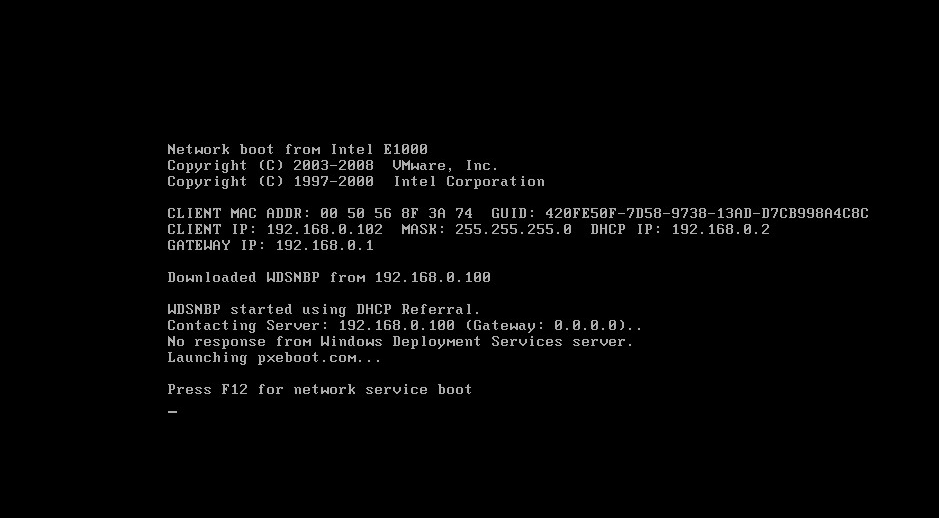Search the Community
Showing results for tags 'PXE'.
-
I have some new HP Pro One 600 All In One units I am trying to pxe boot to run a task sequence on. Everything is normal until it starts to configure network settings, once that pop-up goes away it reboots. When I hit f8 and run an ipconfig it does not have an IP or anything. I am pretty sure I have the right drivers for the nic but could be wrong. When checking the smsts.log I get the following four errors, in order: Failed to download pxe variable file. Code(0x00000001) PxeGetPxeData failed with 0x80004005 RegOpenKeyExW failed for Software\Microsoft\SMS\Task Sequence GetTsRegValue() failed. 0x80070002. Hopefully it is just a checkbox somewhere but have been scratching my head with this for sometime. I am currentling imaging other machines right now with the same task sequence. Thanks for the help.
-
I have to apologize for the length of the post right up front. I am having an issue with PXE boot while using SCCM 2012 R2. The issue is only with 64-Bit machines using UEFI. All others are working correctly. This is running in a test lab so it's a pretty simple setup at this time. I have two boot images (x86 and x64), both are distributed to the DP's and Unknown Computer support is enabled. I have two Task Sequences that I am testing. One is a Windows 7 x86 sequence - using the x86 Boot Image.The other is a Windows 8.1 sequence - using the x64 Boot Image. No applications or anything special in the task sequence, just standard OS installation. I was initially deploying both the x86 and x64 task sequences to the "All Unknown Computers" group. However, this caused issues as SCCM was selecting the initial PXE boot image based upon the last deployment. Therefore it would not always boot the correct architecture. I know I can boot the x86 image and deploy a 64 Bit OS. However, UEFI breaks all of this. When you attempt to PXE boot in UEFI mode, the architecture of the boot image must match the architecture of the machine. I have a mixture of x86 (Latitude 10 tablets) as well as newer x64 UEFI machines. There are also both x86 and x64 non UEFI capable machines. So I need to be able to support Non-UEFI as well as UEFI PXE booting for both the x86 and x64 architectures. To get around the issue with publishing multiple task sequences to Unknown computers, I have created two Collections to try to separate the x86 Unknown Computers and x64 computers. The collections each contain 1 member, the "x64 Unknown Computer" and "x86 Unknown Computer", respectively. I then modified the Windows 7 x86 task sequence to deploy to the "Unknown x86 Computers" collection. I also modified the Windows 8.1 task sequence to use the "Unknown x64 Computers" collection. I can now successfully boot an x86 NON-UEFI machine, an x64 NON-UEFI machine, as well as a UEFI x86 machine. They all pick up the correct boot image and run the task sequence just fine. The issue I am having is specifically with the UEFI 64-Bit machines. They PXE boot just fine, however when they do, they boot from the x86 Boot Image. Of course this doesn't work because of the UEFI mode. I get the following error: I have attached the SMSPXE.log file in case this helps. Now, here is the interesting part..... If I import the UEFI 64 Bit test machine via either the MAC address or GUID and add this to a collection and then deploy the Windows 8.1 Task Sequence to this collection, the machine boots the correct x64 Boot Image and runs the task sequence just fine. Anyone have any ideas how I can specifically target UEFI 64-Bit machines through a collection? -Chris SMSPXE.log
-
Hi Guys! I'm wondering if someone could help me with a really frustrating issue I'm having with SCCM. I'll give you a quick of overview of the environment. - The Laptop we're using is brand new out of the box "HP Elitebook 755 G2" - We are trying to build a 64bit Windows 7 image on the Laptop and then Capture that image to use for the 20+ HP Books we have. - The Task Sequences have already been created and used on other machines so I'm fairly sure it will work once we get the drivers packaged into the TS.
-
Hi Guys! I'm wondering if someone could help me with a really frustrating issue I'm having with SCCM. I'll give you a quick of overview of the environment. - The Laptop we're using is brand new out of the box "HP Elitebook 755 G2" - We are trying to build a 64bit Windows 7 image on the Laptop and then Capture that image to use for the 20+ HP Books we have. - The Task Sequences have already been created and used on other machines so I'm fairly sure it will work once we get the drivers packaged into the TS (For now I just want to test that it will boot up and begin the TS) - Regardless of whether I set "Enable Unknown Computer Support" in the PXE Service Point (With a Restart of the Service) The PC will not boot from PXE, it will just say that "No Bootfile was received" - I have imported the PC into the console through the Computer Association option with SCCM. Does the laptop have to have the SCCM Client on to be able to PXE Boot to the Task Sequence? Something I've never really been able to tell or not! Presumably this isn't the case given the option to "Enable Unknown Computer Support" I'm not entirely sure which direction I am meant to go from here, I've tried looking on various forums etc. but all seem to inform me to do the same thing which hasn't been effective for me. I'd really appreciate any tidbits of information too help me discover the answer! Thanks, Josh
-
Hi Guys! I'm wondering if someone could help me with a really frustrating issue I'm having with SCCM. I'll give you a quick of overview of the environment. - The Laptop we're using is brand new out of the box "HP Elitebook 755 G2" - We are trying to build a 64bit Windows 7 image on the Laptop and then Capture that image to use for the 20+ HP Books we have. - The Task Sequences have already been created and used on other machines so I'm fairly sure it will work once we get the drivers packaged into the TS.
-
Hi community, I'm quite stuck here and cannot find a solution for my problem. I've just added a new boot image (Win7x64) and all I want to do is "add" drivers to the boot image. So I went to - System Center Configuration Manager / Site Database / Computer Management / Operating System Deployment / Drivers right clicked the driver and selected add to boot image. But I cannot select a boot image because the list below is just plain empty although I've added boot images (Win7x64 enterprise (Selected the boot.wim image 2 (Microsoft Windows Setup x64)) - this image is deployed and PXE Deployment is enabled (in the boot image properties). Am I missing something? Thanks for your feedback - best regards
-
i am having inconsistent application installation during PXE deployment and the logs are not helping me out so i was hoping someone else might have an idea. i can image one laptop and get a few missing applications one time and re-image and get a few different applications missing. for each application that fails i see the following Unspecified error (Error: 80004005; Source: Windows) SMSTS log link <![LOG[ Setting Server Certificates.]LOG]!><time="09:51:35.001+240" date="03-24-2015" component="InstallApplication" context="" type="0" thread="2488" file="utils.cpp:6171"> <![LOG[ Setting Authenticator.]LOG]!><time="09:51:35.001+240" date="03-24-2015" component="InstallApplication" context="" type="0" thread="2488" file="utils.cpp:6178"> <![LOG[set authenticator in transport]LOG]!><time="09:51:35.002+240" date="03-24-2015" component="InstallApplication" context="" type="0" thread="2488" file="libsmsmessaging.cpp:7734"> <![LOG[ Setting Media Certificate.]LOG]!><time="09:51:35.002+240" date="03-24-2015" component="InstallApplication" context="" type="0" thread="2488" file="utils.cpp:6195"> <![LOG[sending StatusMessage]LOG]!><time="09:51:35.031+240" date="03-24-2015" component="InstallApplication" context="" type="1" thread="2488" file="libsmsmessaging.cpp:4023"> <![LOG[setting message signatures.]LOG]!><time="09:51:35.032+240" date="03-24-2015" component="InstallApplication" context="" type="0" thread="2488" file="libsmsmessaging.cpp:1295"> <![LOG[setting the authenticator.]LOG]!><time="09:51:35.032+240" date="03-24-2015" component="InstallApplication" context="" type="0" thread="2488" file="libsmsmessaging.cpp:1325"> <![LOG[CLibSMSMessageWinHttpTransport::Send: URL: SR0SCCM03.domain.com:80 CCM_POST /ccm_system/request]LOG]!><time="09:51:35.034+240" date="03-24-2015" component="InstallApplication" context="" type="1" thread="2488" file="libsmsmessaging.cpp:8604"> <![LOG[Request was successful.]LOG]!><time="09:51:35.062+240" date="03-24-2015" component="InstallApplication" context="" type="0" thread="2488" file="libsmsmessaging.cpp:8939"> <![LOG[install application action cannot continue. ContinueOnErrorFlag is set to false.]LOG]!><time="09:51:35.062+240" date="03-24-2015" component="InstallApplication" context="" type="3" thread="2488" file="installapplication.cpp:898"> <![LOG[hrInstallation, HRESULT=80004005 (e:\nts_sccm_release\sms\client\osdeployment\installapplication\installapplication.cpp,899)]LOG]!><time="09:51:35.062+240" date="03-24-2015" component="InstallApplication" context="" type="0" thread="2488" file="installapplication.cpp:899"> <![LOG[pInstall->InstallApplications(saAppNames, sContinueOnError), HRESULT=80004005 (e:\nts_sccm_release\sms\client\osdeployment\installapplication\main.cpp,277)]LOG]!><time="09:51:35.228+240" date="03-24-2015" component="InstallApplication" context="" type="0" thread="2488" file="main.cpp:277"> <![LOG[install Static Applications failed, hr=0x80004005]LOG]!><time="09:51:35.228+240" date="03-24-2015" component="InstallApplication" context="" type="3" thread="2488" file="main.cpp:277"> <![LOG[Process completed with exit code 2147500037]LOG]!><time="09:51:35.232+240" date="03-24-2015" component="TSManager" context="" type="1" thread="3804" file="commandline.cpp:1123"> <![LOG[!--------------------------------------------------------------------------------------------!]LOG]!><time="09:51:35.232+240" date="03-24-2015" component="TSManager" context="" type="1" thread="3804" file="instruction.cxx:804"> <![LOG[Failed to run the action: Install Java. Unspecified error (Error: 80004005; Source: Windows)]LOG]!><time="09:51:35.233+240" date="03-24-2015" component="TSManager" context="" type="3" thread="3804" file="instruction.cxx:895"> <![LOG[MP server http://SR0SCCM03.domain.com. Ports 80,443. CRL=false.]LOG]!><time="09:51:35.234+240" date="03-24-2015" component="TSManager" context="" type="1" thread="3804" file="utils.cpp:5881"> <![LOG[setting authenticator]LOG]!><time="09:51:35.242+240" date="03-24-2015" component="TSManager" context="" type="1" thread="3804" file="utils.cpp:5903"> <![LOG[set authenticator in transport]LOG]!><time="09:51:35.242+240" date="03-24-2015" component="TSManager" context="" type="0" thread="3804" file="libsmsmessaging.cpp:7734"> <![LOG[sending StatusMessage]LOG]!><time="09:51:35.261+240" date="03-24-2015" component="TSManager" context="" type="1" thread="3804" file="libsmsmessaging.cpp:4023"> <![LOG[setting message signatures.]LOG]!><time="09:51:35.262+240" date="03-24-2015" component="TSManager" context="" type="0" thread="3804" file="libsmsmessaging.cpp:1295"> <![LOG[setting the authenticator.]LOG]!><time="09:51:35.262+240" date="03-24-2015" component="TSManager" context="" type="0" thread="3804" file="libsmsmessaging.cpp:1325"> <![LOG[CLibSMSMessageWinHttpTransport::Send: URL: SR0SCCM03.domain.com:80 CCM_POST /ccm_system/request]LOG]!><time="09:51:35.264+240" date="03-24-2015" component="TSManager" context="" type="1" thread="3804" file="libsmsmessaging.cpp:8604"> <![LOG[Request was successful.]LOG]!><time="09:51:35.287+240" date="03-24-2015" component="TSManager" context="" type="0" thread="3804" file="libsmsmessaging.cpp:8939"> <![LOG[set a global environment variable _SMSTSLastActionRetCode=-2147467259]LOG]!><time="09:51:35.288+240" date="03-24-2015" component="TSManager" context="" type="0" thread="3804" file="executionenv.cxx:668"> <![LOG[set a global environment variable _SMSTSLastActionSucceeded=false]LOG]!><time="09:51:35.288+240" date="03-24-2015" component="TSManager" context="" type="0" thread="3804" file="executionenv.cxx:668"> <![LOG[Clear local default environment]LOG]!><time="09:51:35.289+240" date="03-24-2015" component="TSManager" context="" type="0" thread="3804" file="executionenv.cxx:807"> <![LOG[The execution engine ignored the failure of the action (Install Java) and continues execution]LOG]!><time="09:51:35.293+240" date="03-24-2015" component="TSManager" context="" type="2" thread="3804" file="instruction.cxx:962"> <![LOG[MP server http://SR0SCCM03.domain.com. Ports 80,443. CRL=false.]LOG]!><time="09:51:35.294+240" date="03-24-2015" component="TSManager" context="" type="1" thread="3804" file="utils.cpp:5881"> <![LOG[setting authenticator]LOG]!><time="09:51:35.305+240" date="03-24-2015" component="TSManager" context="" type="1" thread="3804" file="utils.cpp:5903"> <![LOG[set authenticator in transport]LOG]!><time="09:51:35.305+240" date="03-24-2015" component="TSManager" context="" type="0" thread="3804" file="libsmsmessaging.cpp:7734"> <![LOG[sending StatusMessage]LOG]!><time="09:51:35.323+240" date="03-24-2015" component="TSManager" context="" type="1" thread="3804" file="libsmsmessaging.cpp:4023"> <![LOG[setting message signatures.]LOG]!><time="09:51:35.325+240" date="03-24-2015" component="TSManager" context="" type="0" thread="3804" file="libsmsmessaging.cpp:1295"> <![LOG[setting the authenticator.]LOG]!><time="09:51:35.325+240" date="03-24-2015" component="TSManager" context="" type="0" thread="3804" file="libsmsmessaging.cpp:1325"> <![LOG[CLibSMSMessageWinHttpTransport::Send: URL: SR0SCCM03.domain.com:80 CCM_POST /ccm_system/request]LOG]!><time="09:51:35.326+240" date="03-24-2015" component="TSManager" context="" type="1" thread="3804" file="libsmsmessaging.cpp:8604">
-
Hi Forum, Please help! Here's the story. When we had our SCCM installed it seems that some bright spark decided to put a trial version of SQL on the server its installed on. Last week the trial ran out and reporting stopped and then no one could connect via the consoles. Our apps team fixed this and we can now log into SCCM 2012 but we cannot build any machines via PXE. Any suggestions? I've checked the SMSPXE.log and see errors: Loaded D:\Program Files (x86)\Windows Kits\8.1\Assessment and Deployment Kit\Deployment Tools\amd64\DISM\wimgapi.dll SMSPXE 24/03/2015 10:36:17 8428 (0x20EC) Opening image file D:\RemoteInstall\SMSImages\MON0006E\winpe8.MON0006E.wim SMSPXE 24/03/2015 10:36:17 8428 (0x20EC) Found Image file: D:\RemoteInstall\SMSImages\MON0006E\winpe8.MON0006E.wim PackageID: MON0006E ProductName: Microsoft® Windows® Operating System Architecture: 0 Description: Microsoft Windows PE (x86) Version: Creator: SystemDir: WINDOWS SMSPXE 24/03/2015 10:36:17 8428 (0x20EC) Closing image file D:\RemoteInstall\SMSImages\MON0006E\winpe8.MON0006E.wim SMSPXE 24/03/2015 10:36:17 8428 (0x20EC) Failed adding image D:\RemoteInstall\SMSImages\MON0006E\winpe8.MON0006E.wim. Will Retry.. Unspecified error (Error: 80004005; Source: Windows) SMSPXE 24/03/2015 10:36:17 8428 (0x20EC) Loaded D:\Program Files (x86)\Windows Kits\8.1\Assessment and Deployment Kit\Deployment Tools\amd64\DISM\wimgapi.dll SMSPXE 24/03/2015 10:38:17 8428 (0x20EC) Opening image file D:\RemoteInstall\SMSImages\MON00004\boot.MON00004.wim SMSPXE 24/03/2015 10:38:17 8428 (0x20EC) Found Image file: D:\RemoteInstall\SMSImages\MON00004\boot.MON00004.wim PackageID: MON00004 ProductName: Microsoft® Windows® Operating System Architecture: 0 Description: Microsoft Windows PE (x86) Version: Creator: SystemDir: WINDOWS SMSPXE 24/03/2015 10:38:17 8428 (0x20EC) Closing image file D:\RemoteInstall\SMSImages\MON00004\boot.MON00004.wim SMSPXE 24/03/2015 10:38:17 8428 (0x20EC) Failed adding image D:\RemoteInstall\SMSImages\MON00004\boot.MON00004.wim. Will Retry.. Unspecified error (Error: 80004005; Source: Windows) SMSPXE 24/03/2015 10:38:17 8428 (0x20EC) Loaded D:\Program Files (x86)\Windows Kits\8.1\Assessment and Deployment Kit\Deployment Tools\amd64\DISM\wimgapi.dll SMSPXE 24/03/2015 10:38:17 8428 (0x20EC) Opening image file D:\RemoteInstall\SMSImages\MON00005\boot.MON00005.wim SMSPXE 24/03/2015 10:38:17 8428 (0x20EC) Found Image file: D:\RemoteInstall\SMSImages\MON00005\boot.MON00005.wim PackageID: MON00005 ProductName: Microsoft® Windows® Operating System Architecture: 9 Description: Microsoft Windows PE (x64) Version: Creator: SystemDir: WINDOWS SMSPXE 24/03/2015 10:38:17 8428 (0x20EC) Closing image file D:\RemoteInstall\SMSImages\MON00005\boot.MON00005.wim SMSPXE 24/03/2015 10:38:17 8428 (0x20EC) Failed adding image D:\RemoteInstall\SMSImages\MON00005\boot.MON00005.wim. Will Retry.. Unspecified error (Error: 80004005; Source: Windows) SMSPXE 24/03/2015 10:38:17 8428 (0x20EC) Loaded D:\Program Files (x86)\Windows Kits\8.1\Assessment and Deployment Kit\Deployment Tools\amd64\DISM\wimgapi.dll SMSPXE 24/03/2015 10:38:17 8428 (0x20EC) Opening image file D:\RemoteInstall\SMSImages\MON00006\WinPE.MON00006.wim SMSPXE 24/03/2015 10:38:17 8428 (0x20EC) Found Image file: D:\RemoteInstall\SMSImages\MON00006\WinPE.MON00006.wim PackageID: MON00006 ProductName: Microsoft® Windows® Operating System Architecture: 0 Description: Microsoft Windows PE (x86) Version: Creator: SystemDir: WINDOWS SMSPXE 24/03/2015 10:38:17 8428 (0x20EC) Closing image file D:\RemoteInstall\SMSImages\MON00006\WinPE.MON00006.wim SMSPXE 24/03/2015 10:38:17 8428 (0x20EC) Failed adding image D:\RemoteInstall\SMSImages\MON00006\WinPE.MON00006.wim. Will Retry.. Unspecified error (Error: 80004005; Source: Windows) SMSPXE 24/03/2015 10:38:17 8428 (0x20EC) Loaded D:\Program Files (x86)\Windows Kits\8.1\Assessment and Deployment Kit\Deployment Tools\amd64\DISM\wimgapi.dll SMSPXE 24/03/2015 10:38:17 8428 (0x20EC) Opening image file D:\RemoteInstall\SMSImages\MON00007\WinPE.MON00007.wim SMSPXE 24/03/2015 10:38:17 8428 (0x20EC) Found Image file: D:\RemoteInstall\SMSImages\MON00007\WinPE.MON00007.wim PackageID: MON00007 ProductName: Microsoft® Windows® Operating System Architecture: 9 Description: Microsoft Windows PE (x64) Version: Creator: SystemDir: WINDOWS SMSPXE 24/03/2015 10:38:17 8428 (0x20EC) Closing image file D:\RemoteInstall\SMSImages\MON00007\WinPE.MON00007.wim SMSPXE 24/03/2015 10:38:17 8428 (0x20EC) Failed adding image D:\RemoteInstall\SMSImages\MON00007\WinPE.MON00007.wim. Will Retry.. Unspecified error (Error: 80004005; Source: Windows) SMSPXE 24/03/2015 10:38:17 8428 (0x20EC) Loaded D:\Program Files (x86)\Windows Kits\8.1\Assessment and Deployment Kit\Deployment Tools\amd64\DISM\wimgapi.dll SMSPXE 24/03/2015 10:38:17 8428 (0x20EC) Opening image file D:\RemoteInstall\SMSImages\MON0000E\winpe.MON0000E.wim SMSPXE 24/03/2015 10:38:17 8428 (0x20EC) Found Image file: D:\RemoteInstall\SMSImages\MON0000E\winpe.MON0000E.wim PackageID: MON0000E ProductName: Microsoft® Windows® Operating System Architecture: 0 Description: Microsoft Windows PE (x86) Version: Creator: SystemDir: WINDOWS SMSPXE 24/03/2015 10:38:17 8428 (0x20EC) Closing image file D:\RemoteInstall\SMSImages\MON0000E\winpe.MON0000E.wim SMSPXE 24/03/2015 10:38:17 8428 (0x20EC) Failed adding image D:\RemoteInstall\SMSImages\MON0000E\winpe.MON0000E.wim. Will Retry.. Unspecified error (Error: 80004005; Source: Windows) SMSPXE 24/03/2015 10:38:17 8428 (0x20EC) Loaded D:\Program Files (x86)\Windows Kits\8.1\Assessment and Deployment Kit\Deployment Tools\amd64\DISM\wimgapi.dll SMSPXE 24/03/2015 10:38:17 8428 (0x20EC) Opening image file D:\RemoteInstall\SMSImages\MON0000F\winpe.MON0000F.wim SMSPXE 24/03/2015 10:38:17 8428 (0x20EC) Found Image file: D:\RemoteInstall\SMSImages\MON0000F\winpe.MON0000F.wim PackageID: MON0000F ProductName: Microsoft® Windows® Operating System Architecture: 9 Description: Microsoft Windows PE (x64) Version: Creator: SystemDir: WINDOWS SMSPXE 24/03/2015 10:38:17 8428 (0x20EC) Closing image file D:\RemoteInstall\SMSImages\MON0000F\winpe.MON0000F.wim SMSPXE 24/03/2015 10:38:17 8428 (0x20EC) Failed adding image D:\RemoteInstall\SMSImages\MON0000F\winpe.MON0000F.wim. Will Retry.. Unspecified error (Error: 80004005; Source: Windows) SMSPXE 24/03/2015 10:38:17 8428 (0x20EC) Loaded D:\Program Files (x86)\Windows Kits\8.1\Assessment and Deployment Kit\Deployment Tools\amd64\DISM\wimgapi.dll SMSPXE 24/03/2015 10:38:17 8428 (0x20EC) Opening image file D:\RemoteInstall\SMSImages\MON00010\winpe.MON00010.wim SMSPXE 24/03/2015 10:38:17 8428 (0x20EC) Found Image file: D:\RemoteInstall\SMSImages\MON00010\winpe.MON00010.wim PackageID: MON00010 ProductName: Microsoft® Windows® Operating System Architecture: 0 Description: Microsoft Windows PE (x86) Version: Creator: SystemDir: WINDOWS SMSPXE 24/03/2015 10:38:17 8428 (0x20EC) Closing image file D:\RemoteInstall\SMSImages\MON00010\winpe.MON00010.wim SMSPXE 24/03/2015 10:38:17 8428 (0x20EC) Failed adding image D:\RemoteInstall\SMSImages\MON00010\winpe.MON00010.wim. Will Retry.. Unspecified error (Error: 80004005; Source: Windows) SMSPXE 24/03/2015 10:38:17 8428 (0x20EC) Loaded D:\Program Files (x86)\Windows Kits\8.1\Assessment and Deployment Kit\Deployment Tools\amd64\DISM\wimgapi.dll SMSPXE 24/03/2015 10:38:17 8428 (0x20EC) Opening image file D:\RemoteInstall\SMSImages\MON00011\winpe.MON00011.wim SMSPXE 24/03/2015 10:38:17 8428 (0x20EC) Found Image file: D:\RemoteInstall\SMSImages\MON00011\winpe.MON00011.wim PackageID: MON00011 ProductName: Microsoft® Windows® Operating System Architecture: 9 Description: Microsoft Windows PE (x64) Version: Creator: SystemDir: WINDOWS SMSPXE 24/03/2015 10:38:17 8428 (0x20EC) Closing image file D:\RemoteInstall\SMSImages\MON00011\winpe.MON00011.wim SMSPXE 24/03/2015 10:38:17 8428 (0x20EC) Failed adding image D:\RemoteInstall\SMSImages\MON00011\winpe.MON00011.wim. Will Retry.. Unspecified error (Error: 80004005; Source: Windows) SMSPXE 24/03/2015 10:38:17 8428 (0x20EC) Loaded D:\Program Files (x86)\Windows Kits\8.1\Assessment and Deployment Kit\Deployment Tools\amd64\DISM\wimgapi.dll SMSPXE 24/03/2015 10:38:17 8428 (0x20EC) Opening image file D:\RemoteInstall\SMSImages\MON0006E\winpe8.MON0006E.wim SMSPXE 24/03/2015 10:38:17 8428 (0x20EC) Found Image file: D:\RemoteInstall\SMSImages\MON0006E\winpe8.MON0006E.wim PackageID: MON0006E ProductName: Microsoft® Windows® Operating System Architecture: 0 Description: Microsoft Windows PE (x86) Version: Creator: SystemDir: WINDOWS SMSPXE 24/03/2015 10:38:17 8428 (0x20EC) Closing image file D:\RemoteInstall\SMSImages\MON0006E\winpe8.MON0006E.wim SMSPXE 24/03/2015 10:38:17 8428 (0x20EC) Failed adding image D:\RemoteInstall\SMSImages\MON0006E\winpe8.MON0006E.wim. Will Retry.. Unspecified error (Error: 80004005; Source: Windows) SMSPXE 24/03/2015 10:38:17 8428 (0x20EC)
-
Hello, We have switched from using Symnatec Ghost for Capturing and Deploying images to using SCCM 2012. The procedure we would typically use for Ghost when we got a new machine is as follows: (General Idea) 1. Load Windows 2. Load Drivers 3. Load Updates 4. Load Software 5. Create image by Pxe'ing to our ghost server and saving this image. 6. Use PXE in Ghost to deploy the image to all other same model computers. Currently with SCCM i'm doing the same first 4 steps then: 5. Capture image using capture media saving OS 6. Deploy using PXE to SCCM Server. Is there anyway to eliminate the need for the capture media and run it from a PXE? I know there are other ways to do this i just haven't learned them yet.
-
I've been trying to create a custom UDIWizard_Config.xml to install my applications during my task sequence, but I haven't been able to get my Applications to show up when I go to Add Software to a group. I know my Configuration Manager settings are correct because my Site Settings are validated. I also have all my applications checked to "Allow this applications to be installed from the Install Application task sequence without being deployed". All my packages show up just fine. The issue is only with Applications. I'm on SCCM 2012 SP1, with MDT 2012 Update 1. Any help will be appreciated. Thanks, Leo
-
I am currently implementing SCCM 2012 and already have SCCM 2007 in place. I have unchecked PXE building in SCCM 2007 and set up PXE building in SCCM 2012 but when I attempt to PXE build on one of our machines it still seems to receive the PXE request from the SCCM 2007 system. If anybody has any ideas why this is happening or where I need to check in 2007 to ensure the function is temporarily disabled then please let me know. 2007 PXE Screen
-
Hi, Currently our manufacturing department is using a physical machine with linux on it serving PXE bootable memtest86+ to the local subnet. They have been managing this server themselves aside from the IT department because we don't really support linux at this time.. but now the person who knew how to use it left, and it stopped working... So now its been put back into IT's hands to get this thing going... and if I need to, I will fix the linux side.... but I would MUCH rather use our existing SCCM setup for this and NOT have multiple PXE/DHCP servers So does anyone know a way to use SCCM to boot into PXE and be presented with memtest86+ to test the memory in that client machine? (this could then be added you the various tutorials on this site because many people would love a way to boot into iso live linux distributions) Here is the linux example: http://wellsie.net/p/286/ Any help is greatly appreciated!
-
Just started having an issue when attempting to PXE into configmgr console for OSD. My machines will pxe to server, load boot image, load WinPE, prepare windows, load nic adapter, hang at 2012 SCCM splash scrren for about 20 seconds, then reboot. Would anybody happen to have a resolution to this issues we are seeing? I have redistibuted/updated distribution points in terms of content including boot images. This just started since i've moved and isolated this pxe service point to a new vlan. Thanks
-
I've been beating my head against a wall trying to figure this out with no success, hoping someone can shed some light. Environment: Server 2012 Standard, x64 (Running on Hyper-V 2012) SQL 2008 R2 SCCM 2012 R2 Recent tasks (in this order) Installed, tested, and uninstalled UIUSD (Universal Imaging Utility) trial, no problems with install or uninstall. I installed CU3 update to SCCM 2012 SP1 I uninstalled ADK 8.0 I installed ADK 8.1 I installed SCCM 2012 R2 Ran windows and microsoft updates I did the upgrade to 2012 R2 to start testing some windows 8.1 deployments. In the midst of trying to get 8.1 deployments working I rebooted the server. Now the Windows Deployment Services Server service won't start. (See attached results from SMSPXE.log) When the service is trying to start, as soon as it hits that last line (Loaded D:\Windows Kits\8.1\Assessment...wimgapi.dll) I get Error: 1067 The process terminated unexpectedly. Windows Application Event Log shows Event 1000: Application Error, Faulting application name: svchost.exe_WDSServer, version: 6.2.9200.16420. Faulting module name: ntdll.dll, version 6.2.9200.16579 Things I have tried doing to fix the problem: Remove boot files from D:\RemoteInstall\SMSImages Re-distribute boot images from SCCM Remove all modules and drivers from boot images, and re-distribute Remove PXE role from DP, delete RemoteInstall folder, reboot, add pxe role, reboot. Nothing I've tried has worked. I've exhausted my google searching abilities. If anyone has suggestions of something to try I would appreciate it. Thanks
- 14 replies
-
- SCCM 2012 R2
- PXE
-
(and 1 more)
Tagged with:
-
Hi everyone, I am currently trying to use WDS on Windows Server 2012 r2. I also have the MDT 2012 and Windows ADK 8.1 installed. I am however, just trying to get WDS barebone working at the moment. I have had WDS working as a standalone but when I moved it to be integrated with Active Directory I have run into issues. The WDS server is on it's own VM and the DHCP/DNS/AD DS are all on another VM. I have set up a VLAN test environment with the two servers and multiple clients all on the same subnet and blocked off from our production environment. There is a screenshot of my client booting from PXE attached here. It downloads the wdsnbp.com from the correct IP. I have tried prestaging in AD with no results. If I add a computer and its GUID in AD, I can see it appear in the prestaged devices in WDS. I know all clients and servers are communicating with each other from looking through the logs. The Deployment-Services-Diagnostics log in EventViewer shows the correct client VM MAC address booting from PXE and downloading wdsnbp.com so I know it is connected to the server. My current WDS settings are: Respond to all client computers (Known and unknown) - with require administrative approval for unknown computers checked. Do not listen on DHCP ports unchecked, and configure DHCP options to indicate that this is also a PXE server unchecked. Allow Windows Deployment Services to dynamically discover valid domain servers Authorize this Windows Deployment Server in DHCP My current DHCP settings are: Option 66 configured to point to WDS server IP Option 67 configure to point to boot\x64\wdsnbp.com (I have tried x86 as well with the same results) I feel like I have tried everything and have run into a wall now. Since it worked as a standalone I believe it is likely to be something wrong with my AD setup. Any help is greatly appreciated.
- 1 reply
-
- WDS
- Windows Deployment
-
(and 2 more)
Tagged with:
-
How to setup a IPV6 PXE server using windows server 2012 or windows server 2012R2? Any document about this?
-
Hello all, I am getting the "ProxyDHCP service did not reply to request on port 4011" error. This is only on certain models, while they are on certain VLANs in our environment. I've checked and the routes are the same on these VLANs as they are at some of our other sites. I have also made sure that DHCP is setup the same for those VLANs as it is everywhere else in our environment. While looking around, I've found articles that said to make sure both boot images are on the distribution point, and they are. I have been fighting with this for about two weeks and don't know what else to do. The SMSPXE log doesn't show that anything is wrong. It shows the same for machines that I can actually PXE boot. Any help is appreciated!
-
- ProxyDHCP 4011
- SCCM 2012
-
(and 1 more)
Tagged with:
-
Hey guys- I am pretty new to SCCM, but I setup a SCCM 2012 SP1 CU4 server. I am using it for Endpoint Protection and Windows Updates. I have been reading on how to use PXE and have followed several guides to get this working. Right now my workstation will successfully boot using PXE. My problem is that the machine reboots immediately after "Preparing Network Connections." I do get an IP address when I push F8 so it's not a network driver issue. I am attaching my smsts.log file. There are 4 error lines in red, but I cannot figure out how to fix this. Coult not create WMI locator class (80040154) Failed to connect to WMI namespace \\.\ROOT\CIMV2 (Code 0x80040154) RegOpenKeyExW failed for Software\Microsoft\SMS\Task Sequence GetTsRegValue() failed. 0x80070002. Any help would be great! Thanks smsts.log
-
I have searched all though these formus, Technet, and any place Google will send me. Any assistance would be appreciated. I'm setting up a new distribution point ("newDP") with dedicated hardware to be used for OSD. The DP is setup, but clients continue to hit the IP of the original DP, despite PXE being disabled on the Orig, but enabled on the New DP. Error Windows Boot Manager (Server IP: "origDP") File: \Boot\BCD Status: 0xc0000098 Info: The Windows Boot Configuration Data file does not contain a valid OS Entry Note that the error indicates the IP of origDP, which is NOT enabled for PXE. The boot files are indeed present (on both DPs).... the problem is wrong IP/server. We do not need or use DHCP option 66 because client and server on same network segment. The SCCM server simply replies directly to broadcast request for PXE server. Troubleshooting Verified DHCP Option 66 isn't responding with the OrigDP address Ensured Restarted WDS service on orig and newDP. Also restarted servers. Ensured boot images (and pxeboot.com) files were present on newDP Erased hard drive of a client device in case somehow using a cached IP from the hard drive (note: it is all clients, though) Ensured PXE is enabled on general tab of newDP, boot images, and Task Sequence Additional detail If I shut down origDP entirely (instead of just disabling PXE), the error changes to TFTP timeout. The SMSPXE.log file on newDP is not updated. It's not updated on origDP either (when PXE/WDS is disabled) I cannot imagine why the IP in the error is for a server not even configured to respond to PXE requests. It's been vexing me for a week and my management is becoming impatient. Any help is GREATLY appreciated. Thanks!
-
Hello there! First i would like to thank you for the help I already got from you guys, even before i posted anything on here. This forum is great! I got a lot of useful information just from reading topics over here. But i'm still struggling... My objective is to get a WDS-server up and running so we can stop using our ghost server for reimaging our clients. I have encountered a number of problems of which I was able to resolve most by searching the web (for example that the client doesn't get an ip-address before trying to PXE-boot). But now I get following messages and I have no clue what to do. PXE-T04: Access Violation PXE-E36: Error Received from TFTP Server PXE-M-F Exiting PXE Rom Everything i find online suggests it is because my server and client are on different subnets or vlans and that it could be resolved by setting up ip helpers on the router. The problem is that my server and client are on the same subnet, I have no vlans configured as far as I know and they are directly connected to the same switch. So this means that normally when one of them broadcasts something it gets forwarded to all the others and it doesn't need interaction with the router. My setup is as follows: I have installed WDS on a seperate server (windows server 2012), so it isn't authorized in DHCP. I added options 66,67 and 60 to the DHCP-server with their required parameters (option 66 points to the ip-address of the WDS-server, option 67 points to the wdsnbp.com file). I also opened up the ports needed on the WDS-server (UDP 67-69, 4011, 50000-65000 and TCP 135, 137-139, 5040). I hope someone can help me out with this. If you need more information of a specific part, I'll try to provide it.
-
I started to get a TFTP time out error imaging PCs here is the log from the server below. Could someone give me some pointers on what to look for? I have removed the PXE from Dist point and rebooted and reinstalled PXE on the dist point. I have checked and recreated a new boot image and check the box to distrubute the boot image. and nothing. I checked my DHCP for option settings are all correct. 066 Boot Server Host Name Standard 067 Bootfile Name Standard SMSBoot\x86\wdsnbp.com SMSPXE.log Start: Client boot action reply: <ClientIDReply><Identification Unknown="0" ItemKey="16778090" ServerName="" ServerRemoteName=""><Machine><ClientID>GUID:869c7a8b-de66-48e9-8c92-a1fb7b6349be</ClientID><NetbiosName/></Machine></Identification><PXEBootAction LastPXEAdvertisementID="" LastPXEAdvertisementTime="" OfferID="XLA20033" OfferIDTime="11/20/2013 3:38:00 PM" PkgID="XLA00036" PackageVersion="" PackagePath="http://HX-SCCM01.XXXX.com/SMS_DP_SMSPKG$/FLA0007D" BootImageID="XLA0007D" Mandatory="0"/></ClientIDReply> SMSPXE 12/11/2013 8:52:21 AM 3060 (0x0BF4) B8:AC:6F:71:86:5B, 4C4C4544-0035-5910-8046-C2C04F524E31: found optional advertisement XLA20033 SMSPXE 12/11/2013 8:52:21 AM 3060 (0x0BF4) End of log. Then the system gets a TFTP PXE-E32 timeout
-
Hi There, I am in the middle of a OS refresh of our estate (XP to Windows 7) and many of the sites are running 20+ machines on slow links (20mb or less) and the OS refresh must be ran outside of hours We have a very tight timescale for the OS refresh so i would like to create a protected distribution point that can be taken to these slow sides and run upgrades locally rather than pulling down the wim 20+times over a slow link. Unfortunately i only have desktop PC's i5 4GB memory at the moment to use for the DP's and plan on once the OS refresh is completed at a site, remove this DP and take it to the next site. I would like to know if i can just use Windows 7 and set this as a protected branch distribution point or if i would be best to install Server 2008 and set it up as a full DP with PXE support? The important aspect is being able to move the protected DP between sites (reassigning the protected boundary each time) SCCM 2007 SP2 R3, 1 primary site server, no secondary sites and a couple of main DP's in main sites. Thanks
-
- Distribution Points
- SCCM
-
(and 4 more)
Tagged with:
-
Alright, I've been having an insane amount of trouble with SCCM for the last few weeks. I am hoping someone can help me. I have combed these message boards and tried so many fixes, but no go. Setup: SCCM 2012 SP1 Server - 10.1.8.12 DHCP Server - On 172.x.x.x network DHCP Options: 66: 10.1.8.12 67: Tried both smsboot\x86\wdsnbp.com and boot\x86\wdsnbp.com (not sure which to use. Many conflicting posts about them. Also, case sensitive?) When I used to F12, I would get Boot File Not Found. That was before I added the DHCP Options. NOW, however, I get: DHCP.. TFTP. PXE-M0F - Exiting Intel Boot Agent Quite instant after it receives the IP. Now, I have ensured the Files are within both the SMSBoot and Boot folders. Plenty of them. 7 in the SMSBoot and 10 in the boot. I have tried uninstalling WDS. I haven't manually configured anything WDS. I let SCCM do everything. When I try PXE-booting with the laptop, NOTHING is added to the SMSPXE log. NOTHING is added to the DISTMGR log. Everything is added to the C: to avoid any storage-related problems. After restarting WDS service, there is no red in either logs. Please, somebody, save me from the demon. My brain is mush.
-
I built a new secondary site server. It is running SCCM 2007 R3. I have checked and doubled checked that all perms are setup correctly and it has all the things it needs. IIS, BITS, remote diff compression, WebDav, R3. And the machine account has rights to the parent site DB and the machine account is a member of the needed AD groups to give it Admin rights on all required servers. In fact this secondary site is setup exactly like our other secondary sites (which all work) Each time I try to F12 a machine I get PXE-MOF Exiting Intel PXE ROM OS not found error. I've looked at the logs on the secondary site and they all say PXE is working properly. I looked in the System Status Messages and I see this over and over. The SMS PXE Service Point encountered an unknown device. Device MAC Address:00:50:56:A7:01:27 SMBIOS GUID:3EA72742-0A8C-D55A-2C66-BB20A72C145A. I've checked with our network team and they said everything is enabled on their end for DHCP to handle PXE requests. What am I missing or where else should I look?
-
I'm trying to determine the minimum requirements for a DP in 2012 which I'd like to PXE enable. What OS? What Bitness? I THOUGHT I had read that 64 bit was required, but seem to find contradictory information. I don't want to spend my days banging my head against a brick wall if something isn't possible. More specifically I am looking to PXE enable the following two: 1) 2003R2 SP2 x86 2) 2008 Std SP1 Any specific advice as to how to make it WORK would be appreciated if they _ARE_ supported. Thanks.








